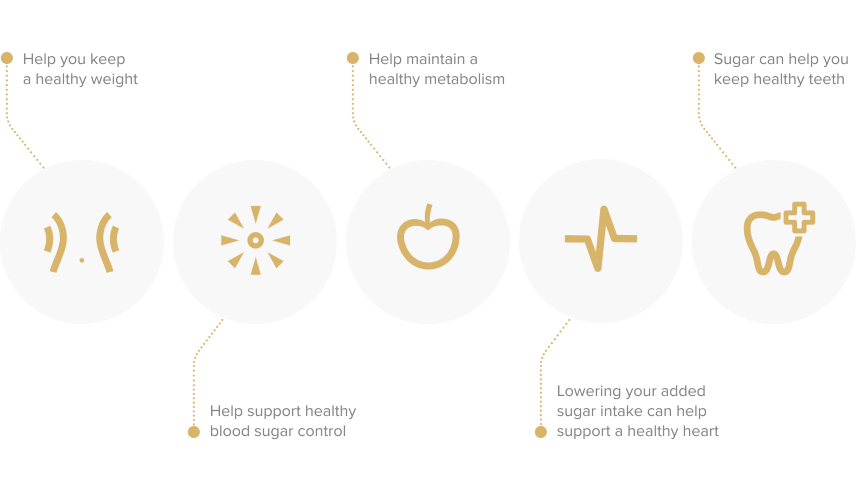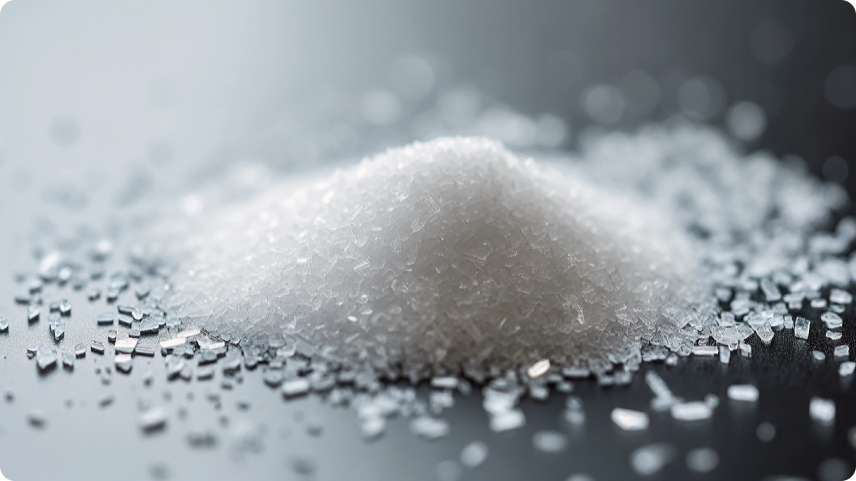What to know about sucralose

What is sucralose?
What’s sucralose, you may ask. Sucralose is an artificial sweetener which is about 380-650 times sweeter than table sugar. It's been around for quite a while, with the first country to approve its use being Canada in 1991. You may know it by another name – Splenda.
Many people are choosing sweeteners to help them cut down on sugar intake. Cutting down on sugar can benefit you in the following ways:
- Help you keep a healthy weight. Added sugars, particularly in sweetened drinks, can increase the risk of weight gain in children and adults. This can increase the risk of other health issues. There appears to be a less clear correlation between drinks with artificial sweeteners and weight gain.
- Help support healthy blood sugar control. High quantities of added sugar can negatively affect our body's ability to regulate blood sugar, increasing the chances of developing type 2 diabetes.
- Help maintain a healthy metabolism. Added sugar intake, especially through sugary drinks, may be associated with developing metabolic problems like metabolic syndrome. Therefore, cutting down on sugar can help your body maintain a healthy metabolism.
- Lowering your added sugar intake can help support a healthy heart. Added sugar intake is associated with a higher risk of cardiovascular issues.
- Help you keep healthy teeth. It can affect our dental health, leading to caries. Therefore, cutting down on it may benefit oral health.

Effects on blood sugar and insulin
Sweeteners like sucralose taste sweet. But what is their effect on our blood sugar and insulin levels?
One way we measure the effect of foods on blood sugar is through the glycemic index. This is a scale of how much the food affects blood sugar levels or how quickly the carbohydrates are absorbed. The glycemic index is a scale of 0 to 100, and slowly absorbed carbohydrates have lower values (under 55). Sucralose’s glycemic index is zero, meaning that it doesn’t affect blood sugar levels.
A small 2013 study showed that sucralose may increase insulin and blood sugar levels in people who don't typically consume sweeteners. However, a more recent meta-analysis of controlled trials suggests that non-nutritive sweeteners like sucralose do not raise blood sugar levels.
In general, it appears that sucralose does not affect insulin concentration. Some studies have found an effect on insulin levels; however, it is hard to compare and draw conclusions due to different methodologies used in the studies. The context of sucralose usage can also confound results. It appears that the combination of carbohydrates and sucralose may affect insulin sensitivity. Sucralose alone, on the other hand, doesn't seem to have the same effect.
However, a more recent study has suggested that long-term consumption of sucralose may affect insulin levels and blood sugar. We need more evidence from longer-term human studies to conclude whether sucralose does affect blood sugar or insulin levels.
How is sucralose produced?
Sucralose sweetener undergoes a complex patented production process. It starts with sucrose, a naturally occurring type of sugar.
Let’s get into the chemistry of sugars, sucrose and sucralose. A sugar is typically composed of carbon, hydrogen and oxygen atoms. Most of the simple sugars we eat, such as glucose and fructose have five or six carbons, arranged in a ring. These simple sugars are called monosaccharides.
Sucrose is a disaccharide, meaning it has two simple sugars joined together. Sucrose is made from glucose and fructose. If you look at its structure, you can see that sucrose contains mainly oxygen and hydrogen atoms attached to each carbon in the ring.
Sugar is added to a chlorinating agent to make sucralose. This replaces some of the oxygens and hydrogens with chlorine atoms. Then, it reacts with a salt to make sucralose-6-acetate. This is sucralose attached to acetic acid. Acetic acid is pretty much the acid that makes vinegar. This acid is then removed to form the final sucralose product.
This is how sucralose is produced on an industrial scale.

Is sucralose healthier than sugar?
Comparing sweeteners like pure sucralose and sugar can be difficult. It depends on the context of the comparison. For example, sugars found in fruits or milk are probably nutritionally healthier than sucralose if consumed as part of the original food. On the other hand, added sugars like cane sugar, honey, or fructose syrup may be worse than sucralose as they provide empty calories, which can lead to weight gain. That’s why it’s good to limit your intake of added sugar.
Sweeteners like powdered sucralose can be a good way to support a healthy weight. The use of sweeteners like sucralose and weight changes have been connected. Sweeteners can help reduce calorie intake, which is necessary for weight loss. They can also make it easier to adhere to an eating plan to support healthier eating habits.
For example, a study of around 3,000 people suggests that overweight individuals using sweeteners can lose significantly more weight compared to those who don’t use them. This is especially evident for those who followed a restricted eating plan.
If you're attempting to lose weight, remember to follow a diet plan with fewer calories than you currently consume. For more tips on how to lose weight effectively and safely, check out our post.
Conversely, certain sweeteners may affect gut health. Our gut contains many different types of beneficial microorganisms. Healthy food habits, like eating plenty of fruit, vegetables, and fiber, can help promote a diverse community of these microorganisms. Consuming sweeteners, including sucralose, may affect gut diversity. However, we must conduct longer and larger clinical studies to understand this more.
There is still much to learn about sucralose, especially since some evidence for benefits or drawbacks is equivocal. Therefore, the best thing you can do for your health is make choices that benefit you more than others. If using sweeteners helps you lose weight or limit your added sugar intake, then that may be more beneficial than consuming added sugars. If you're worried about the potential effects of sweeteners on gut health, add in gut-health-boosting foods containing fiber, probiotics and prebiotics.
Check out more about probiotics and get some inspiration on foods with them in our post.
Is sucralose safe?
Sucralose is an approved sweetener for addition to foods. The FDA approved sucrose in 1999 under certain use conditions. So far, the FDA has reviewed over 110 studies to understand the possible toxic effects of sucralose.
Before sweeteners can be approved, they undergo rigorous safety evaluations, including testing for carcinogenic potential. These tests are designed to determine whether there are any potentially adverse outcomes. In addition, different amounts of the sweetener are tested, including amounts that are much larger than what people would likely consume.
One of the big worries about using sucralose sweeteners is the belief that it causes cancer. A 2016 review suggested that sucralose doesn’t produce any metabolites with carcinogenic activity. It also suggested that people tolerate sucrose well without increasing their risk of cancer. The National Cancer Institute has also suggested that there is no link between sucralose and cancer.
Sucralose appears to mainly pass through the body without much being absorbed. The acceptable daily intake for it is 5 mg per kilo of bodyweight in the US and 15 mg per kilo of weight in the EU.
However, there is a risk when cooking with sucralose. Heating sucralose may not be a great idea. Under high temperatures, around 120 oC, it may form toxic compounds. More research is needed to understand what happens at high temperatures and what the heating limits of sucralose are. If you'd like to stay cautious, it may be best to go for an alternative when baking.
Does sucralose make you gain or lose weight?
There is some conflicting evidence for weight gain or loss with sucralose and other sweeteners, and the literature shows mixed results.
Diet drinks, which often contain sweeteners, consumed without foods appear to be correlated to weight gain. This is likely due to increased food intake and appetite. On the other hand, artificial sweeteners have been linked to helping people lose weight and improving their risk for diabetes and heart disease.
The answer to whether sucralose makes you gain or lose weight is not straightforward.
Sweeteners like sucralose may be helpful when trying to lose weight. However, this requires you to make other changes to support weight loss alongside their use. To lose weight, you can:
- Lower the number of calories you consume in a day. This creates an energy deficit, helping you lose weight.
- Manage feelings of hunger by including more protein. Protein helps keep you full, and it supports muscle mass. The combination can make weight loss easier.
- Get plenty of fiber-rich foods. Fiber is another nutrient that promotes satiety. Therefore, including more foods with fiber is great for weight loss (and helps your gut health, too!).
- Make healthier drink choices. Sugar-sweetened beverages are a source of additional calories. If you drink fruit juice, it's a good idea to limit yourself to one glass of juice a day. Using sweetener-containing beverages can help you get your fix of a sweet drink if you need it, but where you can make sure you stick to water.
- Get moving. A key part of losing weight is moving more. That doesn't mean that you must spend hours in the gym – instead move in ways you enjoy or try active commuting.
- Sleep well. Sleep is essential for weight loss and affects your hunger hormones.
The combination of these factors with using sucralose in moderation can help you achieve your goals.
For more weight loss advice, check out the Knowledge Center.

Who can consume sucralose?
Sucralose is approved for consumption by most groups, including adults, children, elderly and those with specific medical conditions. Most people who use sucralose are those who would like to watch their sugar intake.
The bottom line
Sucralose is a sweetener that is up to 600 times more powerful than sugar. If your goal is to cut down on added sugar, sucralose can be a great helper in that. There appears to be no effect on blood sugar levels and insulin from sucralose, however, there is conflicting evidence that requires more study. If your goal is weight loss, using sucralose wisely and pairing it with common weight loss strategies may be a great way to support weight loss.
There is still much to learn about sucralose, especially since some evidence for benefits or drawbacks is equivocal. Therefore, the best thing you can do for your health is make choices that benefit you more than others. If using sweeteners helps you lose weight or limit your added sugar intake, then that may be more beneficial than consuming added sugars. If you're worried about the potential effects of sweeteners on gut health, add in gut-health-boosting foods containing fiber, probiotics and prebiotics.
Check out more about probiotics and get some inspiration on foods with them in our post.
Is sucralose safe?
Sucralose is an approved sweetener for addition to foods. The FDA approved sucrose in 1999 under certain use conditions. So far, the FDA has reviewed over 110 studies to understand the possible toxic effects of sucralose.
Before sweeteners can be approved, they undergo rigorous safety evaluations, including testing for carcinogenic potential. These tests are designed to determine whether there are any potentially adverse outcomes. In addition, different amounts of the sweetener are tested, including amounts that are much larger than what people would likely consume.
One of the big worries about using sucralose sweeteners is the belief that it causes cancer. A 2016 review suggested that sucralose doesn’t produce any metabolites with carcinogenic activity. It also suggested that people tolerate sucrose well without increasing their risk of cancer. The National Cancer Institute has also suggested that there is no link between sucralose and cancer.
Sucralose appears to mainly pass through the body without much being absorbed. The acceptable daily intake for it is 5 mg per kilo of bodyweight in the US and 15 mg per kilo of weight in the EU.
However, there is a risk when cooking with sucralose. Heating sucralose may not be a great idea. Under high temperatures, around 120 oC, it may form toxic compounds. More research is needed to understand what happens at high temperatures and what the heating limits of sucralose are. If you'd like to stay cautious, it may be best to go for an alternative when baking.
Does sucralose make you gain or lose weight?
There is some conflicting evidence for weight gain or loss with sucralose and other sweeteners, and the literature shows mixed results.
Diet drinks, which often contain sweeteners, consumed without foods appear to be correlated to weight gain. This is likely due to increased food intake and appetite. On the other hand, artificial sweeteners have been linked to helping people lose weight and improving their risk for diabetes and heart disease.
The answer to whether sucralose makes you gain or lose weight is not straightforward.
Sweeteners like sucralose may be helpful when trying to lose weight. However, this requires you to make other changes to support weight loss alongside their use. To lose weight, you can:
- Lower the number of calories you consume in a day. This creates an energy deficit, helping you lose weight.
- Manage feelings of hunger by including more protein. Protein helps keep you full, and it supports muscle mass. The combination can make weight loss easier.
- Get plenty of fiber-rich foods. Fiber is another nutrient that promotes satiety. Therefore, including more foods with fiber is great for weight loss (and helps your gut health, too!).
- Make healthier drink choices. Sugar-sweetened beverages are a source of additional calories. If you drink fruit juice, it's a good idea to limit yourself to one glass of juice a day. Using sweetener-containing beverages can help you get your fix of a sweet drink if you need it, but where you can make sure you stick to water.
- Get moving. A key part of losing weight is moving more. That doesn't mean that you must spend hours in the gym – instead move in ways you enjoy or try active commuting.
- Sleep well. Sleep is essential for weight loss and affects your hunger hormones.
The combination of these factors with using sucralose in moderation can help you achieve your goals.
For more weight loss advice, check out the Knowledge Center.

Who can consume sucralose?
Sucralose is approved for consumption by most groups, including adults, children, elderly and those with specific medical conditions. Most people who use sucralose are those who would like to watch their sugar intake.
The bottom line
Sucralose is a sweetener that is up to 600 times more powerful than sugar. If your goal is to cut down on added sugar, sucralose can be a great helper in that. There appears to be no effect on blood sugar levels and insulin from sucralose, however, there is conflicting evidence that requires more study. If your goal is weight loss, using sucralose wisely and pairing it with common weight loss strategies may be a great way to support weight loss.



